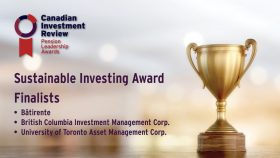

The Canadian Investment Review’s Sustainable Investing Award will be presented to a pension plan that has shown leadership and/or significant progress when it comes to incorporating sustainability into the investment process. This will consider sound practices related to environmental, social and governance matters across asset classes and can include considerations related to people management within a pension plan itself.
Highlights about the three finalists are available below:
Bâtirente
Bâtirente is a group pension system that was established by the Confederation of National Trade Unions in Quebec for its affiliated local unions. Bâtirente has $763.3 million in assets under management and covers 23,000 unionized members from 300 different workplaces. Bâtirente’s board started looking at non-financial risk management in 2005 and implemented guidelines focused on: ESG integration by portfolio managers, shareholder engagement with portfolio companies and increased transparency in ESG reporting. Since 2016, Bâtirente has focused its commitment to sustainable investing on four areas: investment, engagement, measurement, and cooperation. The organization reports annually on its responsible investing results and has also been calculating the carbon footprint of its equity portfolios since 2014. Of note, as of Dec. 31, 2018 the overall carbon footprint of its equity portfolio was 12 per cent lower than the market benchmark. Further, more than 12 per cent of Bâtirente’s assets are now deployed in strategies supporting environmental transition and climate change. In 2020 the organization also made further commitments to ESG including to reduce its exposure to climate risk by 50 per cent by 2025 and to double its allocation to impact investments that contribute to environmental solutions.
British Columbia Investment Management Corp.
ESG is one of the five pillars of the British Columbia Investment Management Corporation’s investment approach. The organization, which has $171.3 billion in assets under management, fully integrates ESG factors into investment management through internal ESG analysis, active engagement with investee companies and actively engaging in sustainable investment policy development internally and externally. Further, it prioritizes equity investments that capitalize new technology and business model innovation and its fixed income portfolio includes green bonds and social bonds. Further, in 2019 BCI developed a global quantitative ESG equity fund to provide exposure to public equities with desirable ESG characteristics. It has also partnered with other firms to establish the Sustainable Development Investments Asset Owner Platform, which uses standard and artificial-intelligence driven data to enable investors to assess companies on their contribution to the UN Sustainable Development Goals. BCI is also a committed active owner, has developed a climate action plan, uses climate-change scenario analysis and has published a climate risk report.
University of Toronto Asset Management Corp.
The University of Toronto Asset Management Corporation, which manages approximately $11 billion in assets, including approximately $5.5 billion for the university’s pension plan, ramped up its focus on ESG in 2016 when it became a signatory to the Principles for Responsible Investment. The UTAM’s ESG integration extends across all asset classes and includes taking an active approach to ownership through engagement, proxy voting and advocacy. The organization also has a responsible investing committee, composed of UTAM’s chief investment officer, investment heads and senior executives across all teams. The CIO and other senior executives provide ongoing responsible investment training to everyone involved in investment decision-making. Further, because the pension plan invests assets primarily through external managers, UTAM has integrated consideration of ESG factors into manager selection and monitoring. The organization has also integrated ESG considerations into its risk management framework. As well, in 2020, the UTAM announced that it is aiming to reduce the carbon footprint of the pension portfolio by at least 40 per cent by the end of 2030 compared to 2017 levels.
To find out who wins, register today for the Defined Benefit Investment Forum, which will feature the Pension Leadership Awards Ceremony. Learn more: http://www.investmentreview.com/conference/defined-benefit-investment-forum-2020
